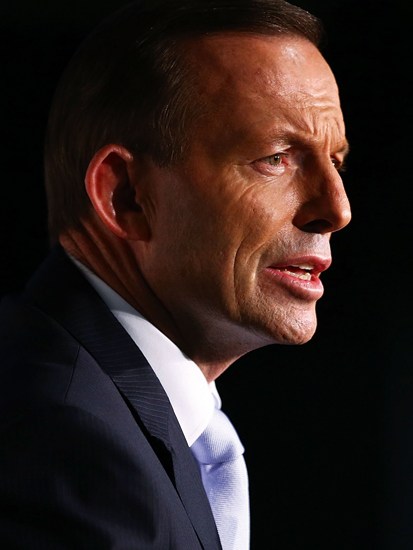You’d be forgiven for missing it, what with the media obsession with knights and dames, but this week marked the 20th anniversary of Tony Abbott’s election to federal parliament. On 26 March 1994, the former head of the Australians for Constitutional Monarchy won a by-election following the resignation of veteran Liberal MP Michael MacKellar in the northern Sydney beaches electorate of Warringah. I was there at that beginning and I’m still here now — watching Abbott’s rise as both a preselection candidate and a Prime Ministerial candidate. On both occasions, the critics wrote him off; on both occasions, they were spectacularly wrong.
I’ve worked with Abbott as his friend two decades ago, before and since his ascent to parliament. I’ve also worked against him as his enemy. Indeed, during the rise of Pauline Hanson’s One Nation in the late 1990s, I was probably his number one enemy! And yet I can’t help but like the bloke. I’ve certainly never underestimated him. I knew he’d one day be PM. He knows I supported him and welcomed his success.
Of course, the idea of a Prime Minister Abbott fills the Left with outrage, and there is hostility from elements of the mainstream media. Some journalists and intellectuals tend to treat him as so loathsome a character that ordinary rules of fair play need not be applied. Hence the stories of a misogynist past. Such disdain transcends politics in the usual sense: Abbott is genuinely despised with a passion once reserved for apostates. One would think after being so wrong for so long, the knockers would come to realise they’d seriously misunderstood and misrepresented Abbott’s capacity to succeed.
However, they’re still underestimating him: Bill Shorten even boasted in January that Abbott will be a ‘oncer’ — a one-term prime minister — which, given both Julia Gillard’s and Kevin Rudd’s failure to serve a full term is a compliment of sorts. In reality, the sophisticates fear Abbott.
Abbott first got in touch with me when he sought federal preselection in early 1994. He was concerned I would influence the outcome of the process. After all, I was the president of the biggest local branch of the Liberal party and I had the ability to influence the largest single group of selectors. He came to my office in Manly with a simple pitch: he wanted me to free up selectors, otherwise beholden to a faction, to vote based on their own frank judgement.
I told those I could influence to choose the best candidate. I added: ‘If that happens to be Tony Abbott, then don’t be persuaded otherwise.’ It made the difference: Tony became the Liberal candidate for Warringah because he was clearly the best candidate.
The usual suspects warned Abbott was too right-wing to be PM. Who can forget David Marr’s insistence that ‘Australia doesn’t want Tony Abbott. We never have’?
Abbott is committed to marriage and family. He’s caring, with strong decent values, but unlikely to let the manufactured plight of the undeserving cloud what is usually his sound, pragmatic view. He created plenty of enemies when he spoke on the high number of abortions in Australia. By articulating his sadness for extinguishing the struggle for life, perhaps he made the mistake of thinking a man is allowed a view that included reducing abortion numbers. Caring for the unborn cost him dearly — the attacks were so irrational that one wonders if, when it comes to abortion, feminist leaders and activists think ‘the more the merrier’? Failing to support the principle of a society with less abortion is akin to being part of the cheer squad for a serial killer.
But a danger lurks: Abbott has already taken so many unfounded hits that he may feel compelled to accommodate his opponents in order to silence the knockers. Just think of his plan for constitutional recognition of a single ethnic group of Australians. Bad strategy. John Howard tried to pacify his opponents when he more than doubled immigration while he hardly challenged political correctness and multiculturalism.
All leaders want to leave a lasting policy legacy — something that stands out as an unassailable act of decency untarnished by party or ideology. For Howard, it was tough gun laws in the wake of the Port Arthur tragedy in 1996. Kevin Rudd would point to the apology to Aborigines. Perhaps Julia Gillard would nominate the National Disability Insurance Scheme. What might Tony Abbott’s tenure leave? Constitutional recognition of Aborigines?
Sure, it’s well-meaning, but it is a flawed idea insomuch that no group is currently mentioned. No group is elevated above Australians as a whole. No matter how it’s done, differentiating one group of descendants from others creates an elite club where membership is determined by one’s racial background. Such a stance would entrench division, not end it. Expect a deep divide between Australians of Aboriginal descent and everyone else. And if you derive from different ancestry — Anglo, Asian, African, European, Middle-Eastern or anything other than Aboriginal — you’ll be treated differently, because you’re not mentioned in the constitution. A legacy that documents racial division will haunt us and tarnish Abbott.
Got something to add? Join the discussion and comment below.
Get 10 issues for just $10
Subscribe to The Spectator Australia today for the next 10 magazine issues, plus full online access, for just $10.
David Oldfield is a social commentator, broadcaster, former One Nation NSW parliamentarian and one-time private secretary to the Hon Tony Abbott MHR
You might disagree with half of it, but you’ll enjoy reading all of it. Try your first month for free, then just $2 a week for the remainder of your first year.














Comments
Don't miss out
Join the conversation with other Spectator Australia readers. Subscribe to leave a comment.
SUBSCRIBEAlready a subscriber? Log in